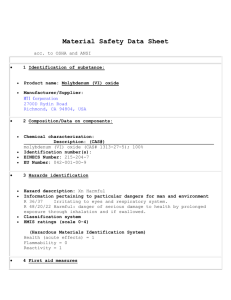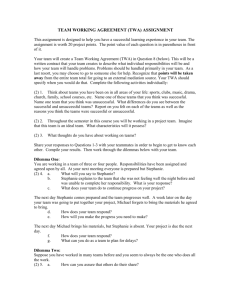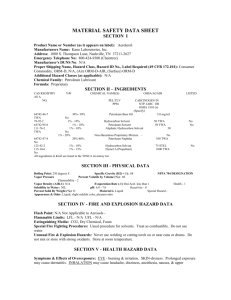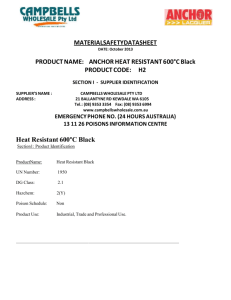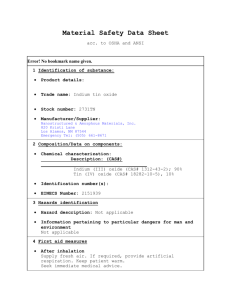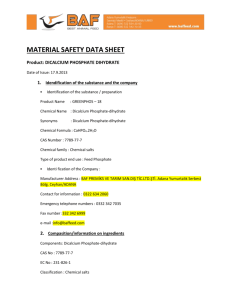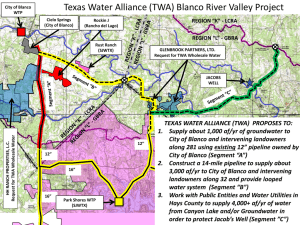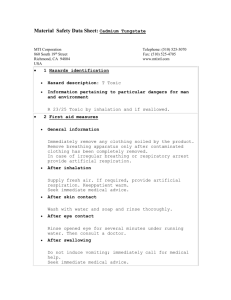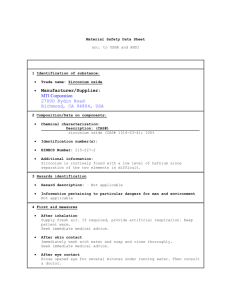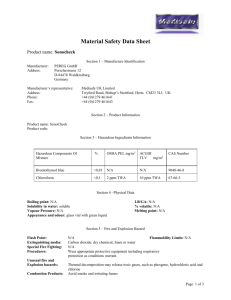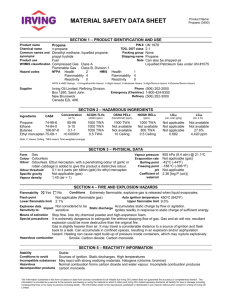Resorcinol - Laboratory for Advanced Materials Processing
advertisement
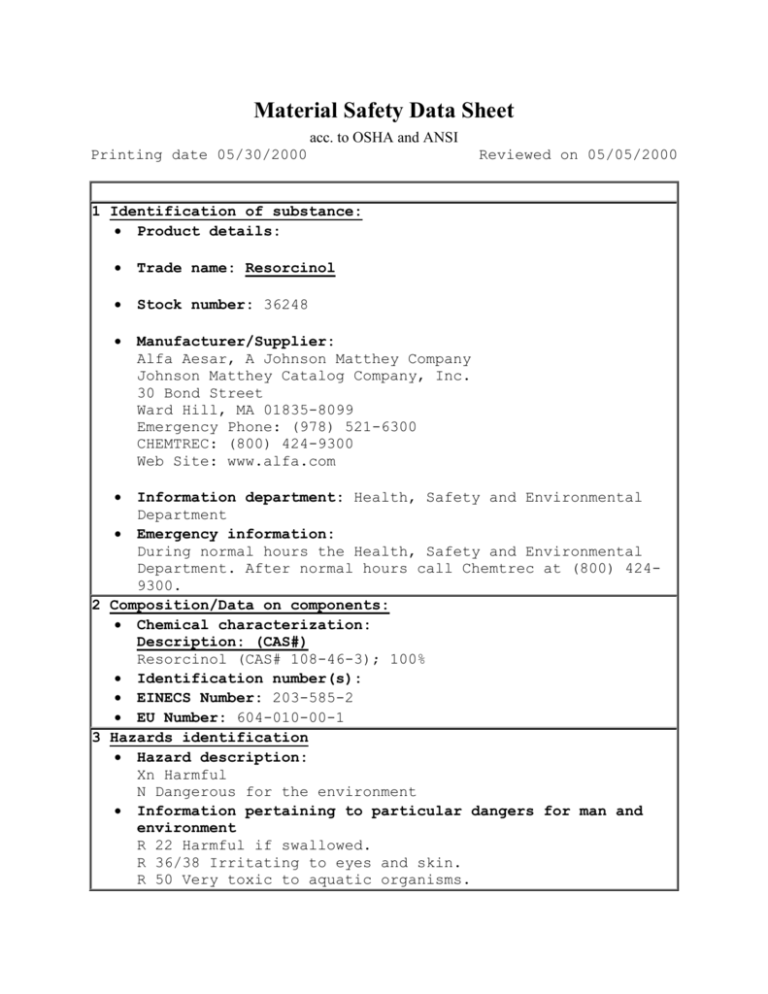
Material Safety Data Sheet acc. to OSHA and ANSI Printing date 05/30/2000 Reviewed on 05/05/2000 1 Identification of substance: Product details: Trade name: Resorcinol Stock number: 36248 Manufacturer/Supplier: Alfa Aesar, A Johnson Matthey Company Johnson Matthey Catalog Company, Inc. 30 Bond Street Ward Hill, MA 01835-8099 Emergency Phone: (978) 521-6300 CHEMTREC: (800) 424-9300 Web Site: www.alfa.com Information department: Health, Safety and Environmental Department Emergency information: During normal hours the Health, Safety and Environmental Department. After normal hours call Chemtrec at (800) 4249300. 2 Composition/Data on components: Chemical characterization: Description: (CAS#) Resorcinol (CAS# 108-46-3); 100% Identification number(s): EINECS Number: 203-585-2 EU Number: 604-010-00-1 3 Hazards identification Hazard description: Xn Harmful N Dangerous for the environment Information pertaining to particular dangers for man and environment R 22 Harmful if swallowed. R 36/38 Irritating to eyes and skin. R 50 Very toxic to aquatic organisms. 4 First aid measures After inhalation Supply fresh air. If required, provide artificial respiration. Keep patient warm. Seek immediate medical advice. After skin contact Immediately wash with water and soap and rinse thoroughly. Seek immediate medical advice. After eye contact Rinse opened eye for several minutes under running water. Then consult a doctor. After swallowing Seek immediate medical advice. 5 Fire fighting measures Suitable extinguishing agents Use carbon dioxide, extinguishing powder or foam. Water may be ineffective but may be used for cooling exposed containers. Special hazards caused by the material, its products of combustion or resulting gases: In case of fire, the following can be released: Carbon monoxide (CO) Protective equipment: Wear self-contained respirator. Wear fully protective impervious suit. 6 Accidental release measures Person-related safety precautions: Wear protective equipment. Keep unprotected persons away. Ensure adequate ventilation Measures for environmental protection: Do not allow material to be released to the environment without proper governmental permits. Measures for cleaning/collecting: Dispose contaminated material as waste according to item 13. Additional information: See Section 7 for information on safe handling See Section 8 for information on personal protection equipment. See Section 13 for disposal information. 7 Handling and storage Handling Information for safe handling: Keep container tightly sealed. Store in cool, dry place in tightly closed containers. Ensure good ventilation at the workplace. Information about protection against explosions and fires: No special measures required. Storage Requirements to be met by storerooms and receptacles: No special requirements. Information about storage in one common storage facility: Store away from oxidizing agents. Further information about storage conditions: Keep container tightly sealed. Store in cool, dry conditions in well sealed containers. 8 Exposure controls and personal protection Additional information about design of technical systems: Properly operating chemical fume hood designed for hazardous chemicals and having an average face velocity of at least 100 feet per minute. Components with limit values that require monitoring at the workplace: ppm ACGIH TLV 0 Belgium TWA 0 Denmark TWA 0 Finland TWA 0 France TWA 0 Germany TWA 0 Hungary TWA 0 Ireland TWA 0 Netherlands TWA 0 Poland TWA 0 Russia TWA 0 Sweden TWA 0 Switzerland TWA 0 United Kingdom TWA 0 USA PEL 0 Additional information: No data Personal protective equipment General protective and hygienic measures The usual precautionary measures for handling chemicals should be followed. Keep away from foodstuffs, beverages and feed. Remove all soiled and contaminated clothing immediately. Wash hands before breaks and at the end of work. Avoid contact with the eyes and skin. Breathing equipment: Use suitable respirator when high concentrations are present. Protection of hands: Impervious gloves Eye protection: Safety glasses Tightly sealed goggles Full face protection Body protection: Protective work clothing. 9 Physical and chemical properties: Form: Powder Color: Pink Odor: Weak Value/Range Unit Method Change in condition Melting point/Melting range: 110 ° C Boiling point/Boiling range: 281.4 ° C Sublimation temperature / start: Not determined Flash point: 127 ° C Ignition temperature: 605 ° C Decomposition temperature: Not determined Danger of explosion: Product does not present an explosion hazard. Explosion limits: Lower: Not determined Upper: Not determined Vapor pressure: Not determined Density: at 20 ° C 1.271 g/cm3 Solubility in / Miscibility with Water: at 20 ° C 1.4 g/l 10 Stability and reactivity Thermal decomposition / conditions to be avoided: Decomposition will not occur if used and stored according to specifications. Materials to be avoided: Oxidizing agents Acid chlorides Acid anhydrides Light Dangerous reactions No dangerous reactions known Dangerous products of decomposition: Carbon monoxide and carbon dioxide 11 Toxicological information Acute toxicity: LD/Lc50 values that are relevant for classification: Oral: LD50: 200 mg/kg (mus) LD50: 301 mg/kg (rat) LDLo: 29 mg/kg (hmn) Dermal: LD50: 3360 mg/kg (rbt) Inhalative: LCLo/1H: 160 mg/m3/1H (rat) Irritation of skin: moderate: 20 mg/24H (rbt) Irritation of eyes: severe: 100 mg (rbt) Primary irritant effect: on the skin: Irritant to skin and mucous membranes. on the eye: Irritating effect. Sensitization: No sensitizing effects known. Subacute to chronic toxicity: Resorcinol is primarily a skin and eye irritant. It can be absorbed through the skin especially if carried by a suitable solvent. Exposure may cause edema and lymph gland enlargement, methemoglobinemia, cyanosis, convulsions, tachycardia, dyspnea and death. Local symptoms include hyperemia, itching and dermatitis. Experimental carcinogenic results have been reported. Additional toxicological information: To the best of our knowledge the acute and chronic toxicity of this substance is not fully known. IARC-3: Not classifiable as to carcinogenicity to humans. ACGIH A4: Not classifiable as a human carcinogen: Inadequate data on which to classify the agent in terms of it's carcinogenicity in humans and/or animals. The Registry of Toxic Effects of Chemical Substances (RTECS) contains tumorigenic and/or carcinogenic and/or neoplastic data for components in this product. 12 Ecological information: General notes: Also poisonous for fish and plankton in water bodies. Do not allow material to be released to the environment without proper governmental permits. 13 Disposal considerations Product: Recommendation Consult state, local or national regulations for proper disposal. Uncleaned packagings: Recommendation: Disposal must be made according to official regulations. 14 Transport information DOT regulations: Hazard class: 6.1 Identification number: UN2876 Packing group: III Hazardous substance: 5000 lbs, 2270 kg Proper shipping name (technical name): Resorcinol Land transport ADR/RID (cross-border) ADR/RID class: 6.1 Toxic substances Item: 14c Danger code (Kemler): 60 UN-Number: 2876 Description of goods: Resorcinol Maritime transport IMDG: IMDG Class: 6.1 UN Number: 2876 Packaging group: III EMS Number: 6.1-04 MFAG: 710 Proper shipping name: Resorcinol Air transport ICAO-TI and IATA-DGR: ICAO/IATA Class: 6.1 UN/ID Number: 2876 Packaging group: III Proper shipping name: Resorcinol 15 Regulations Product related hazard informations: Hazard symbols: Xn Harmful N Dangerous for the environment Risk phrases: 22 Harmful if swallowed. 36/38 Irritating to eyes and skin. 50 Very toxic to aquatic organisms. Safety phrases: 26 In case of contact with eyes, rinse immediately with plenty of water and seek medical advice. 61 Avoid release to the environment. Refer to special instructions/Safety data sheets National regulations All components of this product are listed in the U.S. Environmental Protection Agency Toxic Substances Control Act Chemical Substance Inventory. Information about limitation of use: For use only by technically qualified individuals. 16 Other information: Employers should use this information only as a supplement to other information gathered by them, and should make independent judgement of suitability of this information to ensure proper use and protect the health and safety of employees. This information is furnished without warranty, and any use of the product not in conformance with this Material Safety Data Sheet, or in combination with any other product or process, is the responsibility of the user. Department issuing MSDS: Health, Safety and Environmental Department. Contact: Darrell R. Sanders
